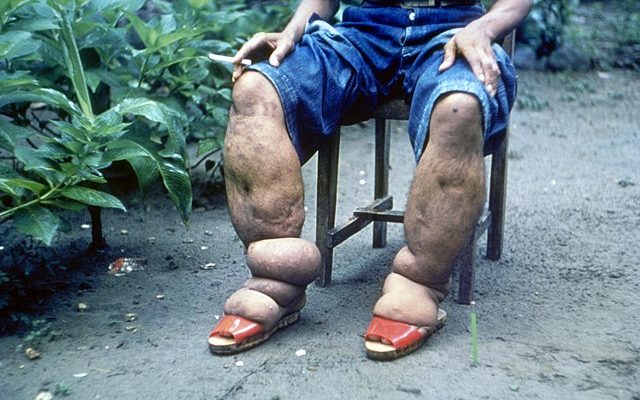The World Health Organization (WHO) congratulates Brazil for having eliminated lymphatic filariasis as a public health problem.
“Eliminating a disease is a momentous accomplishment that takes unwavering commitment,” said Dr Tedros Adhanom Ghebreyesus, WHO Director-General. “I congratulate Brazil for its efforts to free its people of the scourge of this painful, disfiguring, disabling and stigmatizing disease. This is another example of the incredible progress we have made against neglected tropical diseases and gives hope to many other nations still fighting against lymphatic filariasis that they too can eliminate this disease.”
Lymphatic filariasis, commonly known as elephantiasis, is a debilitating parasitic disease spread by mosquitoes. For centuries, this disease has afflicted millions worldwide, causing pain, chronic, severe swelling, serious disability, and social stigmatization.
Effective country-level investments
Over the past few decades, Brazil has implemented integrated actions to eliminate lymphatic filariasis, including the development of a national plan to fight this disease in 1997, the mass distribution of antiparasitic drugs, vector control activities, and strong surveillance, particularly in the most affected areas. With these efforts, the country achieved the end of disease transmission in 2017.
The elimination of lymphatic filariasis was also one of the goals of the Brasil Saudável program, a multisectoral initiative aimed at ending socially determined diseases with a whole-of-government approach and civil society participation, including the involvement of affected people in the implementation of disease control efforts. The programme was launched in February 2024 by President Luiz Inácio Lula da Silva in a ceremony with the participation of Dr Tedros Adhanom Ghebreyesus, WHO Director-General and Dr Jarbas Barbosa, Director of the Pan American Health Organization (PAHO) and WHO Regional Director for the Americas. In the post-elimination phase, Brazil, PAHO, and WHO will continue to closely monitor for possible resurgence of infections.
“This milestone is the result of years of dedication, hard work, and collaboration among health workers, researchers, and authorities in Brazil”, said Dr Jarbas Barbosa, PAHO Director and WHO Regional Director for the Americas. “Brazil’s extensive and unified health system, coupled with solid specialized laboratory expertise and robust surveillance were essential to interrupt the chain of transmission, inspiring other countries to advance towards the elimination of lymphatic filariasis and other neglected tropical diseases”.
Global progress
Globally, Brazil joins 19 other countries and territories that have been validated by WHO for having eliminated lymphatic filariasis as a public health problem. These are Malawi and Togo in the African Region; Egypt and Yemen in the Eastern Mediterranean Region; Bangladesh, Maldives, Sri Lanka and Thailand in the South-East Asia Region; and Cambodia, Cook Islands, Kiribati, Lao People’s Democratic Republic, Marshall Islands, Niue, Palau, Tonga, Vanuatu, Viet Nam and Wallis and Futuna in the Western Pacific Region.
In the Americas, three endemic countries (Dominican Republic, Guyana, and Haiti) still require mass drug administration to stop transmission and are working to achieve the elimination target.
In addition to being the 20th country to be validated for elimination of lymphatic filariasis as a public health problem, Brazil has also become the 53rd country to have eliminated at least one neglected tropical disease, globally.
Lymphatic filariasis, commonly known as elephantiasis, is a neglected tropical disease. Infection occurs when filarial parasites are transmitted to humans through mosquitoes. Infection is usually acquired in childhood and causes hidden damage to the lymphatic system.
The painful and profoundly disfiguring visible manifestations of the disease – lymphoedema, elephantiasis and scrotal swelling – occur later in life and can lead to permanent disability. These patients are not only physically disabled, but suffer mental, social and financial losses contributing to stigma and poverty.
Elimination of lymphatic filariasis is possible by stopping the spread of the infection through preventive chemotherapy. The WHO-recommended preventive chemotherapy strategy for lymphatic filariasis elimination is mass drug administration (MDA). MDA involves administering an annual dose of medicines to the entire at-risk population. The medicines used have a limited effect on adult parasites but effectively reduce the density of microfilariae in the bloodstream and prevent the spread of parasites to mosquitoes.
In 2023, 657 million people in 39 countries and territories were living in areas that require preventive chemotherapy to stop the spread of infection. In the Americas, Costa Rica, Suriname, and Trinidad and Tobago were removed from the WHO list of lymphatic filariasis endemic countries in 2011. The 2021–2030 neglected tropical disease road map targets the prevention, control, elimination and eradication of 20 diseases and disease groups by 2030. Progress against lymphatic filariasis and other neglected tropical diseases alleviates the human and economic burden that they impose on the world’s most disadvantaged communities.





